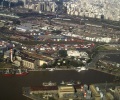

The costs of shipping grains from farming powerhouse Argentina would rise under the government’s proposal for requiring cargo ships to pay tolls to the state rather than to the company that dredges the Parana River, industry leaders said on Monday.
The government disagrees, saying it actually aims to decrease logistical costs while improving agricultural output.
It is the latest chapter in a long saga of farmers and exporters opposing government intervention in the sector.
The dredging of the county’s grains superhighway gives Argentina an edge over rival exporters Brazil and the United States, which rely more on less efficient trucks and slow-moving barges.
Last week the government outlined its proposal for managing the river. It said the state, rather than the company that dredges the waterway, should receive the tolls that cargo ships pay to use the key agricultural shipping hub of Rosario, from which flow about 80% of Argentine grains exports.
That proposal inflamed exporters and farmers already worried about the policies of center-left President Alberto Fernandez, a Peronist whose administration has curtailed beef exports as a way of controlling domestic food price inflation.
The state should oversee the logistics system, and guarantee transparency in the bidding for the upcoming dredging contract, said Luis Zubizarreta, head of Argentina’s CPPC private ports chamber. But he said the dredger, not the government, should continue to collect the tolls paid by cargo ships.
“The current system works well, with the users of the river paying tolls directly to the dredging company. We need to keep it in place,” Zubizarreta said.
“If the flow of money goes through the state it would increase the cost of dredging services,” he added.
But a Transportation Ministry source, who asked not to be named, said the proposed dredging system would not make it more expensive to ship grains from Argentina.
“It does not imply higher costs. One of our objectives is to lower the cost of logistics,” the source said.
The National Ports Administration has been given authority over the next 12 months to subcontract management of the waterway, while the Transportation Ministry evaluates bids from dredging companies for the long-term concession to follow.
Agriculture is Argentina’s main source of export dollars. The country is the world’s No. 3 corn exporter and top supplier of soymeal livestock feed.
An increase in government involvement would create the risk that the dredging company that wins the upcoming concession may not get paid on time, said Gustavo Idigoras, head of the CIARA-CEC chamber of exporters and oilseed crushing companies.
“If the tolls go to the government, it may not transfer all that money to the company that maintains the river. That implies an increase in tolls,” Idigoras said.
“If the government does not pay the dredging company on time, it would probably stop doing the dredging. That would be a serious problem that would increase not only the cost of exporting from Argentina but importing as well,” he added.
The river at Rosario is dredged to about a depth of 34 feet, and industry leaders want the next long-term contract to provide for a deeper and wider shipping channel.
Source: Reuters (Reporting by Hugh Bronstein Editing by Paul Simao)